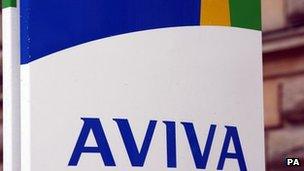Aviva loses vote on executive pay at its AGM
- Published

Shareholder votes on remuneration are not currently binding
Insurance firm Aviva has lost the vote on executive pay at its annual meeting.
Excluding abstentions, 54% voted against the remuneration report at its annual general meeting (AGM), in what will be seen as a major embarrassment for the company.
Shareholders are angry about the amount the new UK chief executive, Trevor Matthews, was paid when he joined.
Outgoing chairman Colin Sharman apologised to investors at the meeting for ignoring their views.
"We recognise a number of shareholders felt we have not reflected their views. For that, the board and I apologise," he said.
One month's work
BBC business editor Robert Peston said: "It's pretty embarrassing, this almost never happens. It's a big slap in the face."
Mr Matthews, who has an annual salary of £720,000 a year, joined Aviva on 2 December, so the remuneration report only covers his first month in the job.
He received a bonus of £45,000 for that month's work. He was also given a £470,000 cash payment and £2.02m worth of shares to make up for shares and bonuses that he would have received had he stayed with his previous employer.
He also a received a long-term incentive plan that, if Aviva shares go up, will give him a cash payment of the amount extra that £1.62m of shares would be worth.
In addition, he got £35,280 to pay his legal fees and a £1,309 car allowance.
Shareholders are also annoyed about falling share prices and dividends. Aviva shares have fallen by more than a quarter over the past 12 months.
Earlier in the week, Aviva's group chief executive Andrew Moss agreed not to take a rise in his pay, which would have taken his £960,000 salary to above £1m.
Counting abstentions, the vote was 50% against the remuneration report and 41% in favour with 9% abstaining.
'Waking up'
It is only the fourth time that a FTSE 100 company has lost a vote on a remuneration report.
Shareholder votes on pay are only advisory, so while the defeat is embarrassing for the company it is not binding.
"This shows that investors are waking up to the problem of high pay," said Louise Rouse from the campaign group Fair Pensions.
"This result reinforces the need for the shareholder vote on pay to be binding but there is still a long way to go if shareholders are to be an effective force in holding companies to account."
Shareholders overwhelmingly voted to re-elect Andrew Moss as chief executive, with 95% in favour.
Aviva had already announced a review of executive recruitment and pay once it became clear that there was to be a protest vote.
"A number of shareholders have indicated that they would like to see a different approach to the way we compensate senior directors on recruitment and an even closer correlation between our pay packages and shareholder returns," Scott Wheway, head of the firm's remuneration committee said on Monday.
Last week, holders of 26.9% of Barclays shares voted against its remuneration report, which was considered a very big protest vote.
- Published30 April 2012
- Published27 April 2012
- Published27 April 2012
- Published8 March 2012